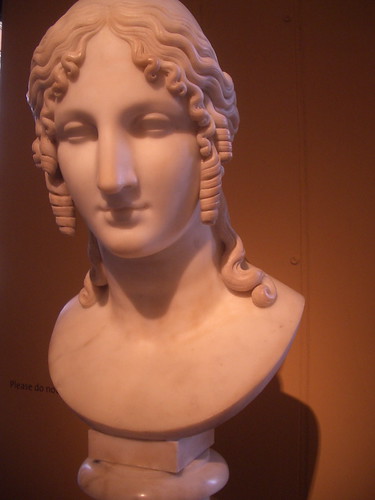When students have to argue in their writing, they often do it adamantly, plainly, without persuasive subtlety. But an argument essay works best when the writer can draw the reader along, a friendly arm about the shoulder, persuading the reader to agree with him on minor points until suddenly they find themselves together at the writer's conclusion, and it all seems so obvious. At least that's the hope.
In the Progymnasma called "Confirmation/Refutation," a writer works through a set form of argument, examining the possibility, probability, credibility, and other characteristics of a proposition. The exercise gives students a chance to investigate or promulgate an urban myth, pet theory, or historical dilemma of their choice. In the Intermediate level of my Progymnasmata Tutorial I provide my own investigation into George Washington's wooden dentures. This summer one student decided to look into the claim of Herodotus, and later others, that Helen was never in Troy during the decade-long siege of Homer's epic.
Michael Helvey, 10th grade, begins by setting up the history of the original story and establishing Homer as the ultimate extant source of the tale, and then showing that Herodotus is inconsistent in his quibbles and that almost no-one else agreed with him--oratory students of ancient times even took on the ridiculous challenge of TRYING to argue that Helen was not in Troy. Then he fast-forwards us to a few centuries ago and shows how more recent thinkers have revisited the question:
In the Age of Reason, everything was most unreasonably thrown into uncertainty, with Descartes setting out to “doubt everything,” and the chronological snobbery so characteristic of Modernity automatically casting every fact from the ancient and Medieval worlds into suspicion. When men were unsure of their own existence, it is no surprise that they also doubted the veracity of Homer. John Stuart Mill, reflecting the temperament of his age, referred to the “alleged siege of Troy,” in his The Subjection of Women. Earlier, Blaise Pascal wrote that “Homer wrote a romance, for nobody supposes that Troy and Agamemnon existed any more than the apples of the Hesperides. He had no intention to write history, but only to amuse us,” (Pensées, part ix, §628). For them, Helen was not only not in Troy, but neither she nor Troy had ever existed.A greener student might have argued something simple, like this:
In the 17th century Descartes argued that Helen was not in Troy, and John Stuart Mill questioned the whole story, calling it the "alleged siege of Troy." Others agreed. So great minds of a few centuries ago doubted whether Helen was in Troy or even existed. But even though they doubt the story, that does not make it false.Note how this "greener" version just puts the facts out there plainly, showing us only that people disagree, and some of those people famous smart ones. The final declaration, typical of a young writer, relies on the declaration that the existence of an opposition does not prove that opposition. That's a pretty thin argument.
But look at what Michael does in presenting this material. He uses "unreasonably thrown into uncertainty" and "chronological snobbery . . . automatically . . . casting every fact . . . into suspicion." Note the negative constructions, the twist of criticism, the accusation of narrowmindedness! This last would be especially appealing to today's reader, even if he is himself a purveyor of chronological snobbery.
Even more effective, note his explanation of the mindset of Descartes and Mill, "men unsure of their own existence." Instead of dismissing these big names with reference only to their conclusions, he quotes them, letting them speak for themselves. And of course a man unsure of his own existence would be even more unsure of the existence of a woman or a city a couple of millennia before!
By presenting his opposition with interpretations of their mindset and culture, by quoting them directly to let them speak for themselves, Mr. Helvey shows true command of his material, demonstrates his deep understanding, and helping us trust him for the conclusions that are to come.

No comments:
Post a Comment